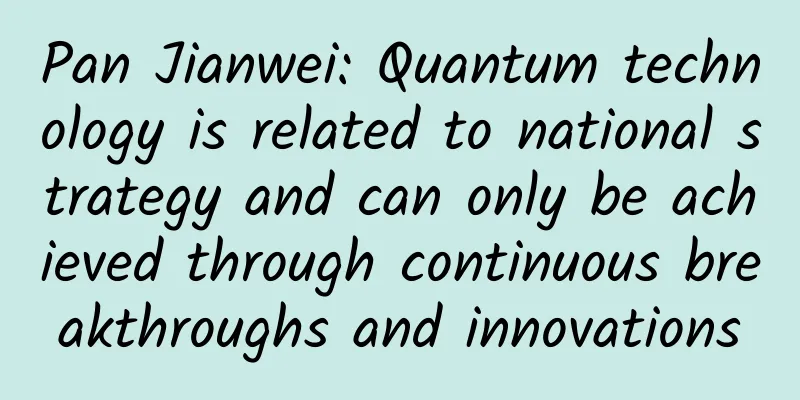Why is it that when someone tries to look cool, it easily offends others?

|
Many netizens teased him and immediately began to imitate him. This "finger on the bridge of the nose" action, combined with a deep expression staring ahead, made him look cool and handsome. Netizens said it had an "abstract" sense of humor. Image source: A social platform Although this is just a performance method in movies and TV dramas, art often comes from life. I believe everyone has seen many such deliberate "showing off" scenes in life, such as some people deliberately winking or sticking out their tongues, and some words that are easy to express in Chinese are frequently mixed with English words in daily conversations. Today, let’s talk about why some people like to deliberately “show off” from a psychological perspective, and why some people are disgusted by it while others like it. Dislike of deliberately showing off may be due to cognitive dissonance In his book "The Presentation of Self in Everyday Life", sociologist Erving Goffman proposed a Self-Presentation Theory, also known as impression management theory, which holds that people often intentionally or unintentionally show certain characteristics of themselves in social situations to influence others' views of themselves and thus win others' recognition of themselves. Therefore, deliberately "showing off" is essentially a typical way of self-presentation. By performing specific behaviors or words, one emphasizes and displays certain aspects of oneself to the outside world. For example, flexing muscles is to show off one's figure and strength, frequently mixing English into Chinese communication is to show off one's language ability, boasting about one's wealth or network resources, etc., to leave others with the impression of being "cool", "capable" or "different". Copyright images in the gallery. Reprinting and using them may lead to copyright disputes. Self-presentation is a normal social behavior. Our words and deeds in daily life and work, or in the process of completing a task or solving a problem, will show our various characteristics to others, and inadvertently complete a self-presentation. Sometimes, in order to win the respect and love of others, we will also show off our excellent side, which does not necessarily cause others to be disgusted, but is conducive to establishing a good relationship with others. The problem is that when this kind of self-presentation is too obvious and unnatural, it may break through some "boundaries" of our inner expectations, making us feel "this doesn't seem to fit my cognition" , and psychologically we will have a feeling of "resistance". This feeling is actually the cognitive dissonance proposed by psychologist Leon Festinger, which refers to an uncomfortable state of psychological tension when we hold multiple contradictory cognitive elements such as knowledge, concepts and attitudes at the same time, or when a certain behavior is inconsistent with one of our own cognitive elements. When we have cognitive dissonance, it will prompt us to alleviate this discomfort by changing cognition or behavior, or downplaying its importance. For example, when we tell a smoker that "smoking is harmful to health", he may say, "My grandfather smoked and lived to be 90 years old" (changing cognition), or smoke less from now on (changing behavior), or he may say, "There are so many things that are harmful to health, smoking is nothing" (reducing its importance). On the other hand, if cognitive dissonance persists and shows no signs of relief, people will continue to feel uncomfortable . This is actually why some people feel "greasy", "disgusted" or even a little "ridiculous" when they see others always deliberately "showing off" without realizing it. Because the other person's show-off looks very deliberate and unnatural, which does not match the impression and cognition of him/her. Always trying to look cool may be "overcompensation" From a deeper psychological motivation perspective, too frequent and exaggerated "showing off" behavior may be a psychological compensation mechanism. This concept was first proposed by psychologist Alfred Adler, and refers to the individual's use of various methods to compensate for psychological imbalances when facing their own defects, deficiencies or setbacks, in order to achieve relative psychological stability and satisfaction. Adler believed that everyone will have a sense of inferiority in childhood due to their own weakness and dependence on the environment. This inferiority complex will stimulate the individual's motivation and prompt them to pursue superiority in various ways to make up for their inner deficiencies. The psychological compensation mechanism is a psychological strategy adopted by individuals in the process of pursuing superiority, which can help individuals overcome inferiority and achieve psychological balance and growth. Copyright images in the gallery. Reprinting and using them may lead to copyright disputes. Each of us has some psychological compensation to a greater or lesser extent. Since no one is perfect, there are always some aspects of ourselves that we are not satisfied with, so we naturally want to make up for our shortcomings. Normally, psychological compensation appears in the form of stimulating growth motivation and maintaining psychological balance. It is a benign psychological mechanism . For example, a person who has been physically weak since childhood will improve his physical fitness through sports and fitness. A person who is not good at socializing may devote his energy to academic research or artistic creation, and use achievements in these fields to gain psychological satisfaction and compensation. But sometimes, when a person has a deep sense of inferiority and insecurity due to deficiencies in certain aspects, he or she may show an "overcompensation" mechanism , that is, excessively pursuing a certain advantage or achievement, even beyond the normal range. For example, a person who grows up in a poor environment may become "materialistic" because of excessive pursuit of wealth and material enjoyment. Overcompensation often requires external recognition to maintain self-worth and reduce inner anxiety and insecurity, rather than pursuing the growth and strengthening of one's own inner strength. Therefore, this kind of compensation can often only achieve short-term results, is difficult to maintain for a long time, and cannot truly heal the inner sense of loss. Therefore, from the perspective of psychological compensation, appropriately showing one's strengths is a benign psychological and social strategy, while being too deliberate in "showing off" may be a form of overcompensation, suggesting a person's deeper inferiority and insecurity. " Deliberately showing off " may also mean "really showing off" Of course, sometimes when we think that others are "trying to be cool", we cannot rule out the possibility that they are "really cool". This aversion to cool behavior may come from emotions hidden or suppressed in our subconscious. Social comparison theory holds that people tend to judge their success or failure by comparing themselves with others. This kind of comparison can be made with those who are better than themselves, or with those who are not as good as themselves, which are called "upward comparison" and "downward comparison" respectively. When we see someone showing off or showing off, it automatically stimulates our "upward comparison", making us unconsciously feel some of our own shortcomings, or touching the weaker and more uneasy parts deep in our hearts, thus regarding the other person's normal behavior as a deliberate show-off, triggering a series of complex feelings, such as jealousy, disgust, anger, disdain, etc., which are actually very natural psychological reactions. However, due to their own lack of emotional awareness or subconscious suppression of negative emotions, they may not be aware of their own complex emotions and true thoughts. Instead, they may use projection or belittlement, thinking that the other person is vain or pretentious in order to protect their own emotions. Therefore, sometimes the behavior of deliberately showing off is not necessarily the other party's excessive self-presentation or psychological compensation, it may also reflect that we ourselves are too sensitive to the unintentional performance of others. It's just that we are occupied by this disgusting emotion and don't realize that we may be automatically making upward comparisons. In conclusion, from a psychological point of view, sometimes showing off is normal and is an important way to show yourself in social interactions. However, showing off too frequently and deliberately may reflect a person's deep-seated insecurity and self-esteem issues. Everyone has their own insecurities and vulnerabilities, and sometimes being cool is just a way for them to protect themselves and gain recognition. Realizing this, when facing people who deliberately act cool, perhaps we can use empathy to understand their psychological motivations, and interact with them in a more friendly and inclusive way, rather than simply criticizing or resenting them, so that they can gradually understand that healthy self-identity does not rely entirely on the evaluation of others, but more importantly comes from the acceptance and growth of the true self. References [1] Suls, J., & Wheeler, L. (2012). Social comparison theory. Handbook of theories of social psychology, 1, 460-482. [2] Leary, MR, & Baumeister, RF (2000). The nature and function of self-esteem: Sociometer theory. Advances in Experimental Social Psychology, 32, 1-62. [3] Harmon-Jones, E., & Mills, J. (2019). An introduction to cognitive dissonance theory and an overview of current perspectives on the theory. In E. Harmon-Jones (Ed.), Cognitive dissonance: Reexamining a pivotal theory in psychology (2nd ed., pp. 3–24). American Psychological Association. Planning and production Author: ACC Psychology Popular Science Reviewer: Fan Chunlei, Associate Researcher, Institute of Psychology, Chinese Academy of Sciences Planning丨Linlin, Yinuo Editor: Yinuo Proofread by Xu Lai |
>>: Brief discussion: What are we still missing in the puzzle of creating scientific miracles?
Recommend
The efficacy and function of Artemisia selengensis
Traditional Chinese medicine often has unexpected...
Adobe: Black Friday online shopping spending will reach $9.8 billion in 2023, a year-on-year increase of 7.5%
U.S. shoppers will spend $12.4 billion online on ...
Gold actually comes from the universe! Can scientists "produce" gold?
We all know that many substances can be synthesiz...
What you see as red is actually cyan? How our eyes are tricked
First, let's look at a picture together. Is t...
The efficacy and function of Cassia tora
Do you know what Cassia tora is? If you know, do ...
Is adding another magic tool to remove formaldehyde another waste of money?
Formaldehyde, the smell of which makes people tur...
The efficacy and function of Tiankuizi
Tiankui seeds are the tubers of the green plant T...
Will rubbing your eyes often make you blind? No kidding! Pay attention to these things
Reviewer of this article: Xu Qibin, associate chi...
Zhou Peiyuan: Defining the coordinates of life based on national needs
Zhou Peiyuan is one of the founders of modern mec...
The efficacy and function of black carp
When it comes to black carp, we are all familiar ...
The efficacy and function of frozen green thorn
Traditional Chinese medicine is very helpful in t...
The "constellations" composed of stars are not used for fortune-telling!
We already know that the sky is filled with twink...
Taobao Mobile announces Weitao data: users exceed 60 million in two months of internal testing
At the beginning of 2013, Qiu Changheng, head of ...
The efficacy and function of the traditional Chinese medicine Curculigo
We may be unfamiliar with Curculigo. Is Curculigo...
Will drinking water with scale for a long time cause kidney stones? The answer is unexpected!
Friends who use kettles to boil water at home sho...









